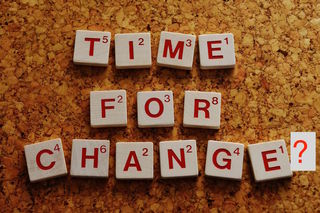Wisdom
Knowing When to Accept and When to Change
The serenity prayer offers sage guidance for a deeply fulfilling life.
Posted June 28, 2017
God, grant me the serenity to accept the things I cannot change, courage to change the things I can, and wisdom to know the difference.
— Reinhold Niebuhr

In its plea for guidance on how to navigate life, the serenity prayer offers great wisdom. While there is much to appreciate in the ability to be accepting and in the ability to busily work to make changes, these qualities are not enough. A greater virtue is to know when to engage each of them—and then, of course, to proactively do so. It’s this latter ability of the “wisdom to know the difference” that many people struggle with, particularly during emotionally intense and upsetting times.
When in the throes of painful feelings, it is natural to want them to go away. But that desire doesn’t offer any insight as to whether the hurt is an appropriate and healthy response—though maybe far from pleasurable. For example, if someone close to you dies, you will probably feel the loss deeply in your body and psyche, an experience we call grief. You may want to be free of the pain, but making that your goal is problematic—it circumvents the healing process. Grief is an experience that is better to learn to accept and engage with. Let the bittersweet memories and emotions wash over you, maybe even knocking you down sometimes. By accepting and respecting your authentic experience, you will find inner peace and acceptance of your loss. This same principle of acceptance being healthy and healing is true for whatever emotional pains you contend with through life.
On the other hand, you may sense that rather than assimilating the experience into you as a person, you feel as though you are losing yourself to the pain. You may feel hopeless, helpless, or like a victim of your own emotions. In this case, it is important to find the clarity and courage to pull free.
This may sound good, but how can you know when to accept the pain and when to use it to change? Though there is no single answer, one way to approach this question is by asking yourself: Is my reaction (self-perception, action, emotion) in proportion to the situation? If your answer is yes, then accept your situation. If your answer is no, then offer yourself compassion for your struggle, but challenge yourself to consider different responses. Consider these examples:
A friend invited David out to meet up with other people he doesn’t know, and the thought of going makes him anxious. He really wants to stay home. When he asks himself whether he is overreacting, he considers how other people might feel. He recognizes that he is not alone in feeling uncomfortable meeting new people, though he might be more anxious than most. But he also realizes that many anxious people go anyway, and that he has had a good time when he’s gone out, too. With an acceptance of his social anxiety, he offers himself some understanding and compassion, and then he goes.
As a regular at Alcoholics Anonymous, Susan embraces the serenity prayer. But it was not always this way. It took some time before she understood that her drinking was excessive and that she needed to accept that alcohol was too big a temptation for her to control. As she accepted she was “powerless” over it, she also came to understand that she did have the power to turn away from situations that would tempt her (like hanging out with her old drinking buddies). She later found the courage to face the ways she hurt herself and others when she drank; and to do what it took to repair her relationships and get her life on a positive path.
You have been in your supervisory position as a sales manager for about a year. Although you see improvement, you are aware of continuing to make many mistakes. When you ask yourself whether you are judging yourself harshly, you realize that you are not. You can see that the learning curve for the job is understandably steep, but that you have been improving with experience. So, rather than criticizing yourself for not being good enough, you accept that learning takes time; and you practice talking compassionately to yourself through your struggles.
Though no one gets it right all the time, you can keep your life moving in a generally positive direction by putting in the effort accept the things you cannot change, change the things you can, and by cultivating the wisdom to know the difference.
Leslie Becker-Phelps, Ph.D. is a clinical psychologist in private practice and is on the medical staff at Robert Wood Johnson University Hospital, Somerset in Somerville, NJ. She is also a regular contributor for the WebMD blog Relationships and is the relationship expert on WebMD’s Relationships Message Board.

Dr. Becker-Phelps is also the author of Insecure in Love and consultant psychologist for Love: The Art of Attraction.
If you would like email notification of new blog postings by Dr. Becker-Phelps, click here.
Making Change blog posts are for general educational purposes only. They may or may not be relevant for your particular situation; and they should not be relied upon as a substitute for professional assistance.
Personal change through compassionate awareness




